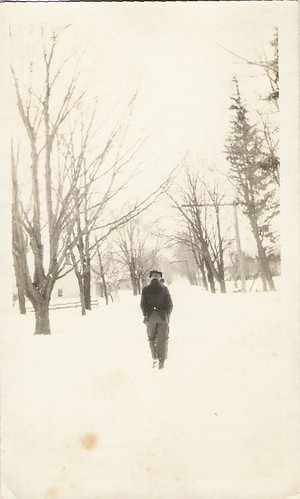I can't even read this again, it was so powerful. It's called "Out, Out -" [on page 247] of the Major Voices and Visions anthology] and I wasn't even able to finish it, but the imagery clung to my thoughts and disturbed me the rest of the day.
It makes no sense, however, to mention a poem affected you profoundly and then not talk about it because it's just too painful to think about, so I'll add some tiny bits I gleaned from other Frost poems.
Frost seems to like the phrase, "the long scythe whispering to the ground" - which he used twice, just in this book. I have to say, I like it too. It has a nice cadence that calls to mind the swinging action and sound of the scythe (my dad used used one and the scythe does make this shushhhhh-shushhhhhing when it swings through the grass, very much like a whisper - a nice change from the gas-powered machinery prevalent today).
Another phrase was final line from "The Wood Pile," "the slow smokeless burning of decay" - which I also found evocative. It called to mind piles of wood chips that "cook" even in winter and give off steam. Something that I like about Frost is that he often has a story to tell, and I like a good story. In the case of "The Wood Pile" it's a conundrum. Why was this neatly stacked pile of wood left behind? Even better, it's a mystery story! Why does the farmer's wife just run off in The Hill Wife? Boredom? Is it related to a poem printed earlier (but not from that group) about the couple breaking up over the difference between how they handled the death of an infant? What was Frost's married life like? Inquiring minds want to know!
Stopping By Woods on a Snowy Evening - this photo always reminds me of that title:

Okay, that poem wasn't in this collection, but every time I see this photo I think of it. Anyway, that's all for Frost. I have lots to do and miles to go before I sleep.







